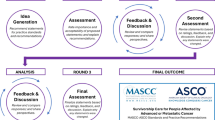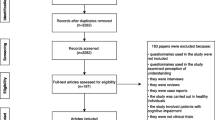Abstract
There is no consensus among healthcare providers on a unified disclosure practice with regard to cancer diagnosis, whether to tell or not. This issue is complicated by the absence of a clear policy for healthcare practitioners, who face this dilemma every day in their clinical practice. This study uniquely aims to explore Jordanian public preference on cancer diagnosis disclosure and the type of information they need. A descriptive cross-sectional survey design was used in this study. The sample consisted of 485 participants who were conveniently selected from the Jordanian public, and data was collected using the Arabic-Cancer Patients Information Needs Questionnaire. The majority of participants were females (56.1%) and most of them (62.1%) were aged between 18 and 29 years. It was found that 421 (86.8%) participants wanted to be informed of the diagnosis if they developed cancer. Participants show high needs of information with mean of total score of 4.2 SD 0.7 out of 5. They mainly demanded to know the things that participants could do to help their cure (mean = 4.47, SD 0.77). Also, they wanted to know whether their cancer was under control or not (item no. 4, mean = 4.42, SD 0.81). This study marks a point of change in public thinking about health issues. Jordanian public preferred to be fully informed of their cancer diagnosis. They wanted information about their prognosis, treatment and the available supportive services, which are of great interest to the Jordanian public.
Similar content being viewed by others
References
Chittem M, Norman P, Harris PR (2013) Relationships between perceived diagnostic disclosure, patient characteristics, psychological distress and illness perceptions in Indian cancer patients. Psycho-Oncology 22(6):1375–1380
Dégi CL (2009) Non-disclosure of cancer diagnosis: an examination of personal, medical, and psychosocial factors. Support Care Cancer 17(8):1101–1107
del Pozo Rodriguez P, Fins JJ, Helmy I, El Chaki R, El Shazly T, Wafaradi D, Mahfoud Z (2012) Truth-telling and cancer diagnoses: physician attitudes and practices in Qatar. Oncologist 17(11):1469–1474
Miyata H, Takahashi M, Saito T, Tachimori H, Kai I (2005) Disclosure preferences regarding cancer diagnosis and prognosis: to tell or not to tell? J Med Ethics 31(8):447–451
Hemati, Hojatollah Shahbazian, Abdol-Azim Sedighi, Reza Khodabakhshi, Ali Taghizadeh, Seyednejad F, Khanduzi R, Mojir Sheibani K, Azadeh P, Alizadeh (2014) Attitude of cancer patients toward diagnosis disclosure and their preference for clinical decision-making: a national survey. Archives of Iranian medicine 17(4):232
Cho J, Smith K, Choi E-K, Kim I-R, Chang Y-J, Park H-Y, Guallar E, Shim YM (2013) Public attitudes toward cancer and cancer patients: a national survey in Korea. Psycho-Oncology 22(3):605–613
Montazeri A, Tavoli A, Mohagheghi MA, Roshan R, Tavoli Z (2009) Disclosure of cancer diagnosis and quality of life in cancer patients: should it be the same everywhere? BMC Cancer 9(1):39
Mitchell JL (1998) Cross-cultural issues in the disclosure of cancer. Cancer Pract 6(3):153–160
Baile WF, Lenzi R, Parker PA, Buckman R, Cohen L (2002) Oncologists’ attitudes toward and practices in giving bad news: an exploratory study. J Clin Oncol 20(8):2189–2196
Ruhnke GW, Wilson SR, Akamatsu T, Kinoue T, Takashima Y, Goldstein MK, Koenig BA, Hornberger JC, Raffin TA (2000) Ethical decision making and patient autonomy: a comparison of physicians and patients in Japan and the United States. Chest Journal 118(4):1172–1182
Newall DJ, Gadd EM, Priestman TJ (1987) Presentation of information to cancer patients: a comparison of two centres in the UK and USA. Br J Med Psychol 60(2):127–131
Munro H, Scott SE, King A, Grunfeld EA (2015) Patterns and predictors of disclosure of a diagnosis of cancer. Psycho-Oncology 24(5):508–514
Mobeireek AF, Al-Kassimi F, Al-Zahrani K, Al-Shimemeri A, Al-Damegh S, Al-Amoudi O, Al-Eithan S, Al-Ghamdi B, Gamal-Eldin M (2008) Information disclosure and decision-making: the Middle East versus the Far East and the West. J Med Ethics 34(4):225–229
Ozdogan M, Samur M, Bozcuk HS, Coban E, Artac M, Savas B, Kara A, Topcu Z, Sualp Y (2004) “Do not tell”: what factors affect relatives’ attitudes to honest disclosure of diagnosis to cancer patients? Support Care Cancer 12(7):497–502
Al Qadire, MRN. Nurses’ Knowledge About Palliative Care
Paydar S, Ghahramani Z (2014) Cancer diagnosis disclosure: what is the right thing to do? Middle East Journal of Cancer 5(2):109–110
Al Qadire M (2014) Jordanian cancer patients’ information needs and information-seeking behaviour: a descriptive study. Eur J Oncol Nurs 18(1):46–51
Wang D-c, Guo C-b, Peng X, Yan-jie S, Chen F (2011) Is therapeutic non-disclosure still possible? A study on the awareness of cancer diagnosis in China. Support Care Cancer 19(8):1191–1195
Alsirafy, SA, SS Abdel-Kareem, NY Ibrahim, MA Abolkasem, and DE Farag (2016) Cancer diagnosis disclosure preferences of family caregivers of cancer patients in Egypt. Psycho-Oncology
Morrison TL, and RL Thomas (2015) Cancer survivors’ concealment or disclosure of diagnosis: Implications for return to work. Journal of WORK (Preprint):1–14
Nwankwo KC, Anarado AN, Ezeome ER (2013) Attitudes of cancer patients in a university teaching hospital in southeast Nigeria on disclosure of cancer information. Psycho-Oncology 22(8):1829–1833
Tsoussis S, Papadogiorgaki M, Markodimitraki E, Delibaltadakis G, Strevinas A, Psyllakis M, Tabakaki K, Drossitis I, Kabourakis A, Papadimitraki E (2013) Disclosure of cancer diagnosis: the Greek experience. J BUON 18:516–526
Ohtsu T (2009) Attitudes of Japanese medical students towards disclosure of a diagnosis of life-threatening illness. Okayama University, Okayama
Wittmann E, Beaton C, Lewis WG, Hopper AN, Zamawi F, Jackson C, Dave B, Bowen R, Willacombe A, Blackshaw G (2011) Comparison of patients’ needs and doctors’ perceptions of information requirements related to a diagnosis of oesophageal or gastric cancer. European journal of cancer care 20(2):187–195
Yalcin A, Silay K, Abdullah BÜYÜKÇELİK, Abdurrahman IŞIKDOĞAN, Hacı Mehmet TÜRK, Hasan Şenol COŞKUN, Feyyaz ÖZDEMİR, Mehmet UĞURLU, Yusuf ÜSTÜ, Bülent YALÇIN (2015) Opinions of the Turkish population on cancer and being informed of the diagnosis of cancer. Turkish Journal of Medical Sciences 45(2):387–392
Rutten LJ, Arora NK, Bakos AD, Aziz N, Rowland J (2005) Information needs and sources of information among cancer patients: a systematic review of research (1980â€2003). Patient Educ Couns 57(3):250–261
Ankem K (2006) Factors influencing information needs among cancer patients: a meta-analysis. Library & Information Science Research 28(1):7–23
Arraras JI, Greimel E, Sezer O, Chie W-C, Bergenmar M, Costantini A, Young T, Vlasic KK, Velikova G (2010) An international validation study of the EORTC QLQ-INFO25 questionnaire: an instrument to assess the information given to cancer patients. Eur J Cancer 46(15):2726–2738
Malim T, Birch A (1997) Research methods and statistics. Macmillan Press, London
Obeidat R, Khrais HI (2015) Information needs and disclosure preferences among Jordanian women diagnosed with breast cancer. J Cancer Educ 30(1):94–99
Obeidat R. 2015. Decision-making preferences of Jordanian women diagnosed with breast cancer. Supportive care in cancer:1–5
Mayer DK, Terrin NC, Kreps GL, Menon U, McCance K, Parsons SK, Mooney KH (2007) Cancer survivors information seeking behaviors: a comparison of survivors who do and do not seek information about cancer. Patient Educ Couns 65(3):342–350
Author information
Authors and Affiliations
Corresponding author
Ethics declarations
Ethical Approval
All procedures performed in studies involving human participants were in accordance with the ethical standards of the institutional and/or national research committee and with the 1964 Helsinki declaration and its later amendments or comparable ethical standards.
Conflict of Interest
The author declares that he has no conflict of interest.
Rights and permissions
About this article
Cite this article
Al Qadire, M. Disclosure of Cancer Diagnosis: an Individualized and Non-paternalistic Approach Is Preferred. J Canc Educ 33, 996–1001 (2018). https://doi.org/10.1007/s13187-017-1192-9
Published:
Issue Date:
DOI: https://doi.org/10.1007/s13187-017-1192-9




